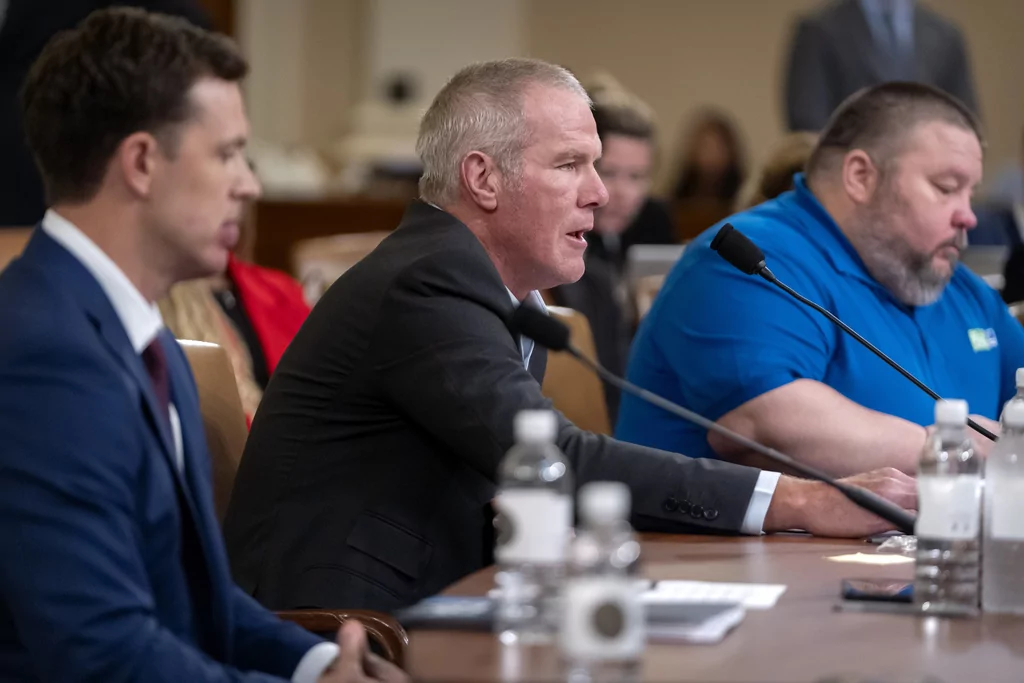
The House Ways and Means Committee held a hearing concerning the “fraud and abuse” of Temporary Assistance for Needy Families welfare funds Tuesday, featuring witnesses such as former NFL quarterback Brett Favre.
The TANF program, which started in 1996 as a successor to the Aid to Families with Dependent Children program, provides cash assistance to families in the United States through the United States Department of Health and Human Services.

The GOP-led congressional hearing brought attention to welfare matters across the U.S. In California, TANF funds were used to plug holes in its state budget. In Mississippi, they were used on unrelated investments, such as constructing a volleyball facility. Across the nation, they were used to afford college aid for families making up to a quarter of a million dollars to attend private colleges, according to the House Ways and Means Committee.
Chairman Jason Smith (R-MO) listed other concerns with the program, such as a lack of eligibility limits and oversight to ensure the money is being used to support work, as well as improper education and training. TANF has no spending deadlines and no guidelines for improper payments.
“One of the things that has enabled the misuse of funds is a lack of guardrails that connect taxpayer dollars to people actually in need,” Smith said. “Together, this lack of federal protections has created the perfect storm for waste, fraud, and abuse. The victims aren’t just taxpayers, but also the Americans in dire straits who need help.”
The program has also not been thoroughly updated since its creation in 1996, so the amount of money allocated to the states is not based on need or poverty but on the population that existed nearly 30 years ago, leaving population booms and rising poverty levels overlooked.
Rep. Richard Neal (D-MA), a ranking member, reminded those of what TANF is supposed to be: A trampoline for struggling families.
“Unfortunately, less than one in four poor families gets assistance from TANF nationally, and many states offer even smaller benefits. We are reminded that TANF is supposed to be a trampoline,” Neal said. “People hit it at a difficult time in their lives, never anticipating perhaps they would need it, and then they bounce back up.”
Proposed reforms include capping TANF eligibility at 200% of the federal poverty level and requiring states to measure and report on improper payment rates. Lawmakers have also suggested increasing federal oversight and accountability to ensure funds are used for their intended purposes and introducing legislation to penalize states that misuse TANF funds, also requiring them to recover and reinvest the misspent funds into supporting struggling families.
Attention was brought to TANF misspending after Mississippi’s 2020 scandal involving Favre and others, in which Mississippi’s government took over $77 million from the welfare program and used it to supply various endeavors, such as Prevacus, a concussion treatment, and a University of Southern Mississippi volleyball center.
Favre was a top investor in both projects, all while saying he was under the impression the funds were government grants rather than welfare. Favre has since repaid Mississippi’s government with all the money he was given, blaming state officials and state auditor Shad White.
“I had no way of knowing there was anything wrong with how the state funded the [volleyball facility], especially since it was publicly approved by many state agencies and multiple attorneys, including the attorney general,” Favre said. “And strangely enough, Shad did not bring a TANF misuse issue to the Department of Justice but to a local DA who himself is now under federal and criminal investigation.”
The witness testimonies emphasized the need for stronger guidelines, rules, and transparency in the federally funded program, aligning Republicans and Democrats in their desire to fix the crucial program.
The only testimony from someone with actual experience relying on the program was Matt Underhile, a 47-year-old Mississippi native who was in the program in 2019 to assist his family while he completed his high school education.
CLICK HERE TO READ MORE FROM THE WASHINGTON EXAMINER
After getting his degree, Underhile participated in the Skill-Up program, where he learned what employers were looking for, how to communicate in workplaces, and how to speak for oneself. Even after getting a job at his local sheriff’s department, Underhile still participates in the TANF programs in his community.
“After you graduate, you’re always encouraged to go back. If life gets too hard, you need to talk to somebody. They’re there for you. If you have trouble finding a job, they’ll help you skill up,” Underhile said. “They helped me figure out how to dig myself out of a hole.”





